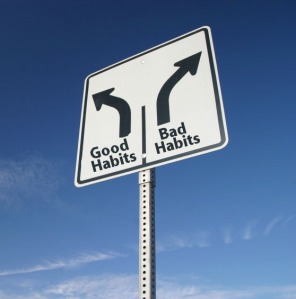HABE – Getting Our Thoughts Right
I wanted an outline
I think I’ve always had an interest in the thoughts and attitudes of successful people who consistently achieved their personal goals. I finally ran into a term a few years back that helped me see where I should focus my attention and energy on daily basis to make the changes I wanted in my life.
 The acronym HABE covers the key areas we need to focus our attention as we work to get our thinking right. It covers all the bases and has become a useful tool to help focus my attention. HABE stands for:
The acronym HABE covers the key areas we need to focus our attention as we work to get our thinking right. It covers all the bases and has become a useful tool to help focus my attention. HABE stands for:
- Habits
- Attitudes
- Beliefs
- Expectations
Virtually everything we do that affects our outcomes can be traced back to one of these 4 categories. I can’t imagine not reaching whatever your personal goal is if you are successful at training yourself in each of these areas.
1. Habits
As we know, habits are those amazingly powerful, automatic, almost effortless choices in our life that determine many of our outcomes. Whether it’s the habit of a good work ethic, a good study routine, or eating the right foods in small portions, our habits help determine our results.
As human beings, habits simplify our lives by allowing us to avoid deciding between the same options every single day. Once we’ve decided our morning routing should be (1) take shower, (2) brush our teeth, (3) get dressed, and (4) walk the dog, we no longer have to think about that which frees our mind to concentrate in other things.
The problem, of course, is falling into unproductive habits which set us on a course for undesirable results, and bad habits tend to sneak up on us. Going to bed late every night leads to tired, listless performance at work. Turning on the TV as soon as we get home leads to the loss of free time that we could have used to develop new skills, exercise to stay fit or improve a relationship.
Consider the familiar example of frogs in the pot of boiling water. As study was conducted where a group of frogs were thrown in boiling water. They jumped out of the pot very quickly and managed to survive. However, when the same frogs were put into room temperature water that was slowly heated, all of them perished when the water came to a boil, because they didn’t have time to react. The slow progression of the heating was less noticeable than the abrupt change in the first example, although the end result of the boiling water was the same for both tests.
Conclusion: Sudden changes are more noticable, but when the change happens over time we don’t feel it until it is too late. Similarly, we don’t develop bad habits over night nor do we experience severe behavior changes in a short period of time but everything happens bit by bit.
For that reason we need to be conscious and careful about the things we begin to do on a repetitive basis. Today’s seemingly harmless act of immediate gratification or laziness can become tomorrow’s recipe for failure over time.
- “The chains of habit are too light to be felt until they are too heavy to be broken.” – Warren Buffet
Conversely, productive habits can produce desired results almost effortlessly. The adage “you reap what you sow” is true, and good habits can help insure we reap the rewards we want.
